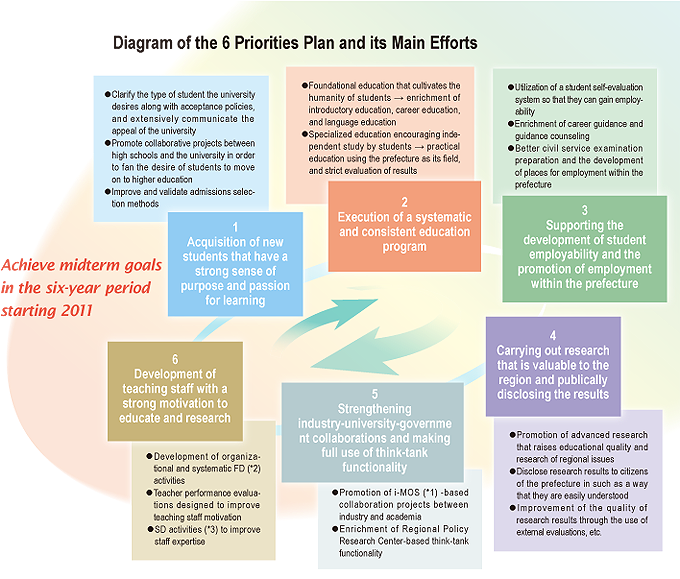- Striving to Become a University that Contributes to Core Human Resource Development
and the Generation of Vitality in the Local Community - Second Phase Midterm Goals
- The 6 Priorities Plan and University-wide Common Plan of the Second Phase Midterm Plan
- Issues to focus on in the 2013 academic year plan
- Featured Topic Iwate Prefectural University Presentation of Research Results for the 2013 Academic Year
 The year 2013 is the third year of our second phase midterm goals period. The operations of Iwate Prefectural University follow an academic year plan, as well as 6-year medium-term objectives based on a medium-term plan spanning from 2011 to 2016.
The year 2013 is the third year of our second phase midterm goals period. The operations of Iwate Prefectural University follow an academic year plan, as well as 6-year medium-term objectives based on a medium-term plan spanning from 2011 to 2016.
Our midterm goals to strive to become a university that contributes to core human resource development and the generation of vitality in the local community are founded on two basic stances: education that puts students first, and research and regional contributions that generate vitality in Iwate.
The university is undertaking an approach to education, research and regional contribution based on 3 basic goals. Our educational goal is to strengthen our students’ ambition. We also want to be a university that the region will depend on for research, contributions to the local community, and international exchange. And, we also want to be effective and flexible in university administrative operations. These goals both affirm the mission of the university when it was founded while looking ahead and embracing various environmental changes.
A university that contributes to core human resource development and the generation of vitality in the region
<Basic Stances>
●Student-Driven Education
● Research and local contribution efforts that vitalize the region
The midterm plan, which is intended to achieve the second phase midterm goals, is composed of a 6 Priorities Plan for issues that have especially high urgency, importance, and continuity, and a University-wide Common Plan that will be taken up by the entire university in order to deploy the priorities plan.

1. Acquisition of new students that have a strong sense of purpose and passion for learning
- Strengthening our internal systems and our collaboration with the Prefectural High School Principals’ Association in order to enhance educational connections between high schools and the university
- Continued economic support of aspiring students affected by the Great East Japan Earthquake and Tsunami so that they can attend the university
- Improvement of local entrance examinations and internally-recommended entrance examinations for international exchange agreements in order to meet our quota of graduate school admissions
2. Execution of a systematic and consistent education program
- Opening the Center for the Advancement of Higher Education, clarifying our fundamental educational policies and ideals, and improving the curriculum in liberal arts and language education
- Systemization of the three policies concerning degree conferment (diploma policies), educational course organization and implementation (curriculum policies) and enrolment acceptance (admission policies) of each faculty
- Full-scale introduction of a new academic assessment system (a 5-stage evaluation system and a GPA system, etc.) with common criteria for more objective performance evaluation and more effective management
3. Supporting the development of student employability and the promotion of employment within the prefecture
- Smooth operation of the IPU-E Map (a student employability evaluation sheet(*4)) through a review of the teaching guidelines and enhancement of the guidance system
- A study of career education with a survey of the implementation of each faculty’s education program and the employment status of graduates
- Facilitation of students’ understanding of the operations of hospitals, businesses, etc., and strengthening of measures such as early participation in civil service courses to encourage graduates to remain in the prefecture
4. Carrying out research that is valuable to the region and publically disclosing the results
- Priority allocation of research funding to research activities that contribute to earthquake disaster recovery and the revitalization and regeneration of the area, and promotion of research for the resolution of local issues, etc.
- Hold university-wide presentations of research results, inform the people of Iwate about a variety of activities such as earthquake disaster recovery research, and share the achievements of local and affiliated companies
- Improvement of the application and selection rates of grants-in-aid for scientific research by helping faculties to improve their skills in creating applications
5. Strengthening industry-university-government collaborations and making full use of think-tank functionality
- Promotion of research in the Earthquake Disaster Reconstruction Research Division and the regional cooperation research initiative (Faculty Proposition Type and Local Community Proposition Type) at the Regional Policy Research Center, and conduct briefing sessions to disseminate research results
- Training of engineers at i-MOS(*1), and development and promotion of car electronics through joint research with private companies
- Promotion of joint research with companies toward the realization of the Takizawa Village IPU Innovation Park concept, and support of business expansion into Innovation Park
- Continuation of activities by faculty and students to assist with reconstruction in response to the situation and needs in the affected areas, and improved awareness of disaster prevention and mitigation
6. Development of teaching staff with a strong motivation to educate and research
- Organizational and systematic approach to improving teaching skills through the effective use of student surveys on classes and reciprocal course auditing among teaching staff
- Enhancement of educational and research activities and resolution of university management issues through the use of a specially-appointed faculty member system, etc.
- Review of training systems based on the Human Resources Development Plan (provisional name) and promotion of skills development of administrative staff through specific effective use of OJT
Featured Topic
Iwate Prefectural University Presentation of Research Results for the 2013 Academic Year
At Iwate Prefectural University, our midterm plan is to promote research that will be evaluated by the local area and to proactively publish the results for the people of Iwate. By proactively holding conferences and presentations of papers, and through various media and public relations materials, we inform the public as widely as possible about our research results and offer these results for their use.
Each department has obtained many research results in their respective fields and presented them at conferences, etc., and through various regional activities they have played the role of a think-tank for the people of Iwate.
In particular, triggered by the Great East Japan Earthquake and Tsunami, we have initiated research into the disaster recovery challenges of the affected areas. Additionally, we have continued efforts to make university research useful to the local region. In the 2011 academic year, we established the Regional Policy Research Center (“Chiseiken”) to address local issues in an organized and combined manner, and also, established the Iwate Monozukuri and Software Integration Technology Center (i-MOS), with the goal of forming an advanced manufacturing industry collective, which creates a variety of innovations in Iwate.
In the course of these events, we held our first Presentation of Research Results at the Iwate Citizen’s Information Exchange Center (Aiina) on September 21st, 2013. With 42 lectures and 94 panel displays about various challenges, as well as the keynote speech, we introduced the research results of every department in the entire university including the Regional Policy Research Center and i-MOS. It was attended by many citizens of the prefecture and guests from related institutions, etc.
Notes
- *1: Iwate Monozukuri and Software Integration Technology Center
*2: An effort to improve course content and methods. Faculty Development.
*3: Efforts to improve the skills of administrative and other staff concerned with the operations of the university. Staff Development.
*4: A series of activities in which students evaluate and visualize their own employability based on their own experience.




